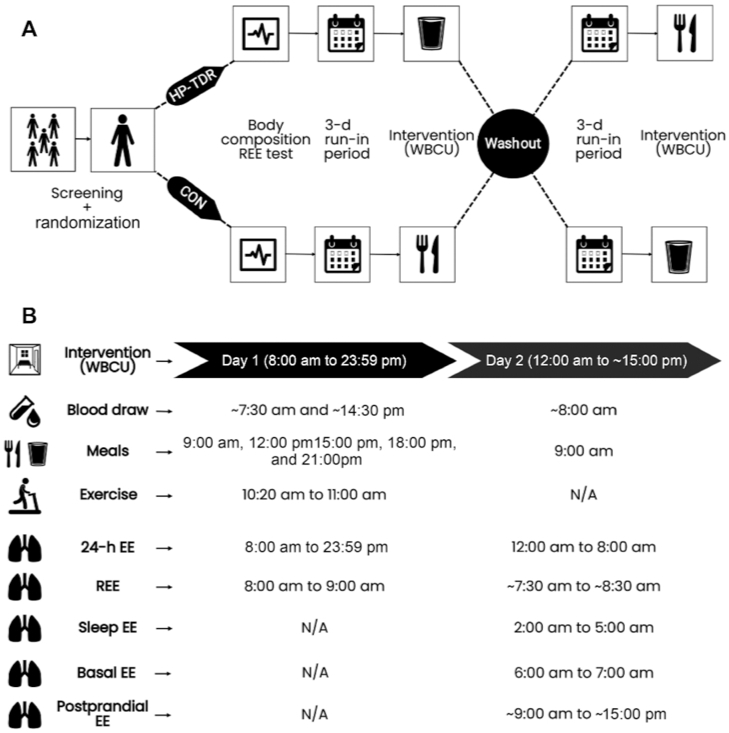Listen on: Apple Podcasts | Spotify
Another study adds to the evidence that a high-protein diet is best for weight loss.
I’ve been promoting the health benefits of a high-protein diet for years. During that time, research and experience have only added evidence to the idea that a high-protein diet is ideal for weight management.
A study published in The American Journal of Clinical Nutrition adds further evidence to protein’s impact on body fat.

Feel Better Fast. Guaranteed.
Energy+, EDGE, and MentaBiotics make up the Happy Juice supplement stack, with ingredients clinically proven to:
- decrease anxiousness scores by 55%
- decrease irritability scores by 60%
- decrease fatigue by 64%
- decrease anger 54%
- decrease tension by 45%
- decrease confusion by 43%
- decrease overall distress by 49%
- increase good bacteria by 70%
- decrease negative mood by 105%
- increase positive mood by 211%
Research Study Design
Researchers compared the impact of consuming only protein-rich shakes multiple times each day to an equal-calorie, normal-protein, whole-food diet. They use the term high-protein total diet replacement (HP-TDR) to describe the protein-shake only protocol.
The total energy intake was the same between the two diets, but the high-protein diet group consumed 211 grams of protein per day, while the control group consumed 83 grams per day (about the same as the average American consumes each day).
| High-Protein | Control | |
|---|---|---|
| Energy, kcal/d | 2129 ± 241 | 2128 ± 241 |
| Protein | ||
| % energy | 39.9 ± 0.3 | 15.3 ± 0.3 |
| g/d | 211 ± 2 | 83 ± 9 |
| Fat | ||
| % energy | 24.9 ± 0.3 | 30.2 ± 0.3 |
| g/d | 58 ± 6 | 72 ± 8 |
| Carbohydrate | ||
| % energy | 35.2 ± 0.3 | 54.4 ± 0.4 |
| g/d | 186 ± 21 | 295 ± 34 |
| Sugars, g/d | 179 ± 21 | 4.6 ± 0.5 |
| Fiber, g/d | 4 ± 0 | 92 ± 12 |
| Saturated fat, g/d | 12 ± 1 | 29 ± 3 |
| Monounsaturated fat, g/d | 35 ± 3 | 16 ± 2 |
| Polyunsaturated fat, g/d | 5 ± 0 | 31 ± 4 |
| Cholesterol, mg/d | 38 ± 9 | 17 ± 1 |
I have to point out a few things about the high-protein diet, outside of the protein, that a typical dietitian would say is bad. I do so only because when people focus only on components of nutrition such as sugar or fiber, they overlook the components of a diet that really make a difference.
As this study shows, a higher-protein intake has a significant, positive impact, in spite of other aspects a dietitian would say will make you fatter and sicker.
First, the difference in sugar intake. The high-protein group consumed 179 grams of sugar per day, 96% of their total carbohydrate intake. It’s also more than seven times what is recommended for daily sugar intake by public health advocates. Sugar is supposed to make you fat, right? Or a diabetic? We’ll see…
Second, the difference in fiber intake. Low-fiber intakes are also supposed to make you fat, aren’t they? Well, the high-protein group consumed only 4 grams of fiber per day. Meanwhile, the control group consumed 92 grams of fiber per day.
When you speak to a typical nutritionist or dietitian, they’ll often speak of sugar as poison and fiber as a miracle food. Both points of view are highly exaggerated.
Third, the protein source was soy. I typically recommend avoiding soy protein. It has a lower bioavailability and contains soy isoflavones, which mimic estrogen. Would the results be different from an animal-based protein source? Perhaps, but based on other research, I’d expect a similar outcome. That said, the results in this study speak for themselves.
The study participants spent 32 hours in a whole-body calorimetry unit (WBCU), which is the most accurate and expensive way to track metabolic rate measures.
The following is a visual depiction of the study protocol:

Due to its expense and the difficulty in having someone live in a WBCU for days or weeks, this is a short-term diet study. It’s possible the findings would change over time, but based on my experience with clients eating higher-protein diets, I highly doubt the results would change with a longer study duration.
Study Findings
According to the study authors:
The primary findings of this study were that compared with a standard North American dietary pattern, a HP-TDR led to higher total EE, increased fat oxidation, and negative fat balance (likely implying body fat loss).
Increased daily calorie expenditure, sleep, and post-meal metabolic rate
While individuals resting or basal metabolic rates did not change, they did burn more calories in total for the day, during their post-meal window, and even during sleep.
This makes sense as protein requires significantly more calories for digestion and assimilation than carbs or fat.
What I find most intriguing is that the protein in this diet came from protein powder. Protein powder is easier to digest than cooked meat. Yet even with the diet consisting of only protein powder, metabolic rate increased.
Increased fat burning, decreased carbohydrate usage
Respiratory exchange ratio (RER) decreased in the high-protein group, which suggests their reliance on fat as a fuel source increased.
Here’s where I get geeked out. With a higher protein intake, you’d expect a more stable blood sugar level. Yet, the majority of carbs the high-protein group consumed came from sugar. Remember? They consumed 179 grams of sugar! And yet, even with that massive amount of sugar, their fat metabolism increased.
Perhaps, if you eat enough protein, you can get away with a little more (or a lot more) sugar in your diet.
Triglyceride levels dropped
The high-protein group did eat fewer total carbs than the control group. Yet, again, the majority of their carbs came from sugar. A high-sugar diet is associated with elevated triglycerides.
Yet, even with such a high sugar intake, triglyceride levels dropped.
LDL cholesterol increased
When you remove cholesterol from the diet, you should see a reduction in blood cholesterol, right? Wrong.
Your body regulates cholesterol levels pretty well. If you eat less, you produce more. If you eat more, you produce less.
The high-protein group ate less cholesterol, yet their LDL cholesterol increased. As the researchers explained, this is likely due to the body’s homeostatic control of cholesterol. Since they consumed less, their bodies started producing more.
Given enough time, they’d probably end up with the same blood cholesterol levels as they started with. It’s just that their bodies would produce it since they weren’t consuming it.
Read also: Low-Carb vs Low-Fat vs High-Protein: Which diet is best?
How does this help someone interested in improving their health or losing weight?
As I’ve always said, it’s easier to tell someone to eat more of one food than to eat less of another.
When you eat more protein, it tends to crowd out carbs and fat from your diet. If you eat more meat, you’ll end up eating fewer potatoes.
But even if you’re hellbent on counting calories, if you simply shift where those calories come from, you can create a marked difference in your metabolism.
And don’t forget, a high-protein diet offers many other health benefits as well.
If you don’t want to drink a shake for every meal (I don’t recommend that anyway), I’d expect you to get similar results from consuming other protein-rich foods like cottage cheese, eggs, meat, poultry, and fish.



